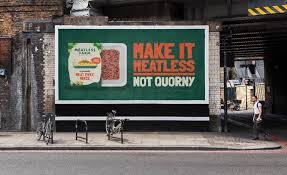The rise of the conscious consumer and what it means for food manufacturing
Plant-based, vegan, flexitarian– no longer just buzz words in the food industry. With over 600,000 vegans in the UK, the British market for meat substitutes is the largest in Europe and estimated to grow to £658m in 2021 – food manufacturers are watching this space.
In 2018, the UK launched more vegan products than any nation. 2021 became the year that every one of the top UK supermarkets (by revenue) had their own vegan range, and 16% of all ready meals were-plant based, rising from just 3% in 2018.
Meat free Monday is here to stay!
This January has seen the likes of Leeds based, Meatless Farm launching cheeky, humour based creatives and sector stalwart, Quorn challenging the status quo with a clear mission to ‘save the planet’ leading their latest marketing campaign. Both are clear demonstrations that plant-based preconceptions are shifting amongst the masses.

A staggering 92% of plant-based meals consumed in the UK in 2018 were eaten by non-vegans, and more than a quarter of all evening meals in the UK are vegan or vegetarian.
It seems veganism has lost it once ‘niche lifestyle’ connotations and consumers are paying attention to the health benefits of a plant-based diet.
We’ve already seen a huge shift towards sustainability across the sector, with packaging reduction a key focus in food manufacturing. We previously discussed in our blogs, what really matters when it comes to packaging design and how to develop a food manufacturing sustainability strategy. The plant-based trend is part of a wider movement towards more mindful and conscious consumption, with the environment and ethics a key consideration to British consumers.
More and more food manufacturers are placing sustainable, ethical, value driven policies at the heart of their business, with an increasing number demonstrating their commitment to people and planet before profit. Ingredient supplier, Kalsec is the latest food producer to achieve B Corp Certification, operating with a ‘rigorous’ set of environmental and social standards.
What does the conscious consumer mean for the future for food manufacturing?
Vegans and vegetarians will make up a quarter of the British population in 2025, and flexitarians just under half of all UK consumers.
Meat-free food consumption is set to play an even greater role in the British consumer shopping basket, and this presents its own set of opportunities and challenges to the food manufacturing industry, including diversification and accelerated growth in production and demand.
A comprehensive strategy, regular competitor and consumer research, machinery inventory, and evaluation of practices and processes are all essential for any food manufacturer. A strong supply chain and trusted contractor and supplier network are also fundamental to support your business.
Here at FESS Group, we are excited to be supporting clients in the plant-based market across Yorkshire and in the South of England, including leading names in the sector. We have hands on experience with the increasing amount of new technology available and work with our clients to push the status quo on innovation, increasing both quality and yield growth.
Our mechanical and engineering teams have been managing and leading on, on-site re-configurations, fit outs and construction projects to support expansion plans and future proof business growth. And we have a dedicated service for machinery maintenance, relocation and hire services to accommodate changing and growing demands.
It’s undoubtedly an exciting, and challenging time for the food industry. The opportunities presented with the increasingly popular meat-free, conscious consumer appetite, mean UK manufacturers can lead the charge as the rest of the world follows.
If we can be part of your extended team to help grow and develop your food manufacturing business, do get in touch.
Sources: